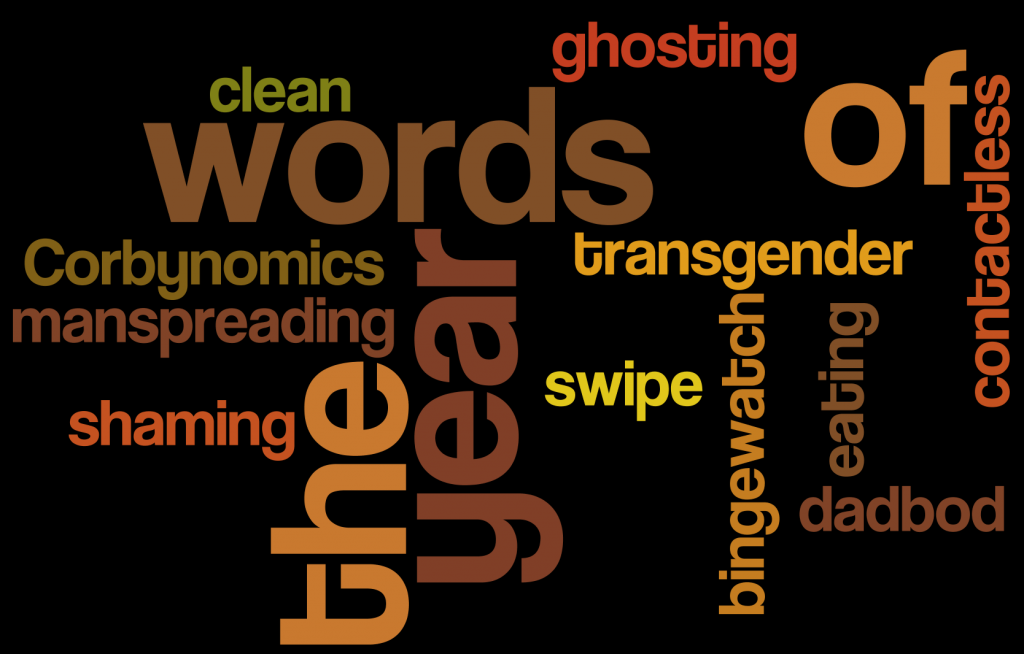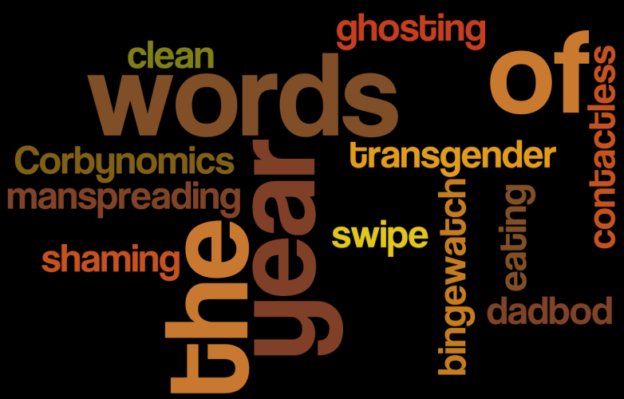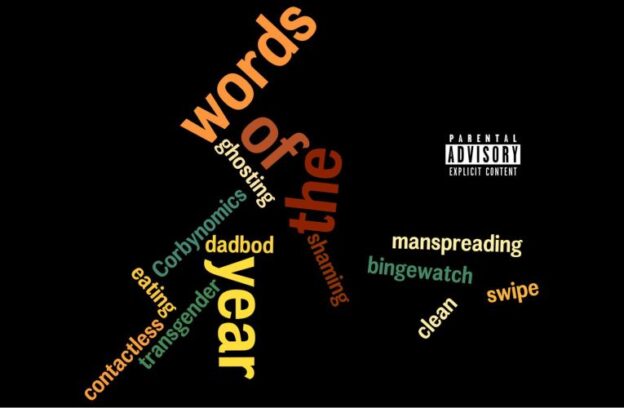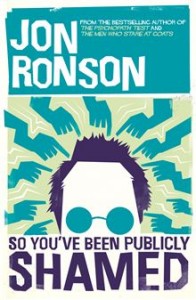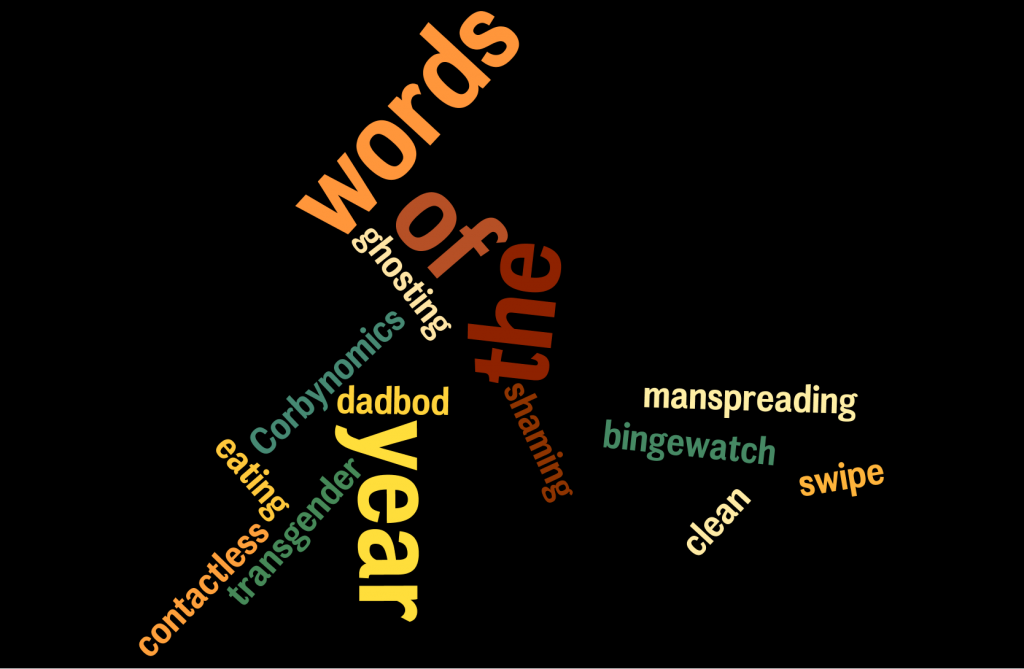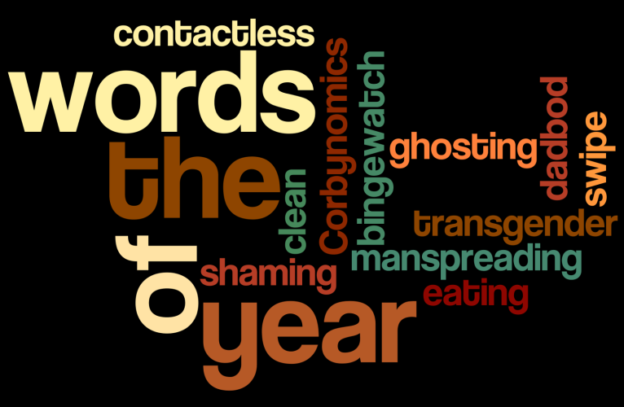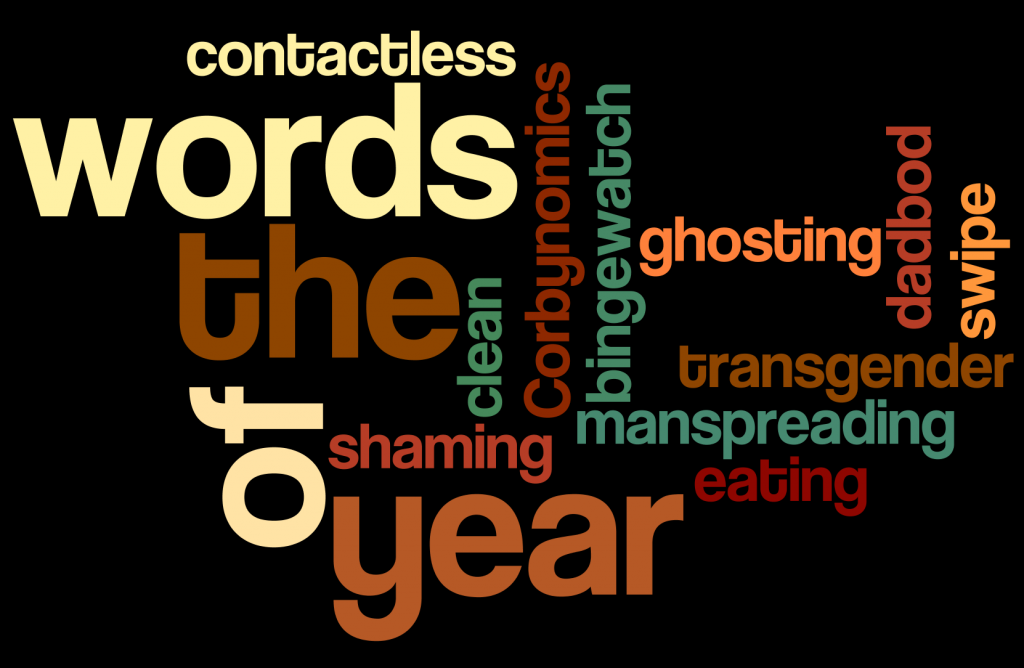Here’s the third part in this series about the Collins Dictionary Words of the Year 2015. Listen to the episode to hear Amber, Paul and me discuss the rest of the words in the list. I’ll also explain and clarify some vocabulary, grammar and pronunciation from our discussion. There are vocabulary notes below.
![]() [DOWNLOAD]
[DOWNLOAD]
Welcome back to another episode of LEP. We’re still talking about the Collins Dictionary Words of the Year.
This is the third episode on the series, and we still have about 7 words to deal with.
I think we can wrap this up inside one episode, but let’s see.
I’m going to keep this intro as short as possible because recently my introductions have got out of control.
So, let me keep it short and simple.
This is the 3rd part in a mini-series about The Collins Dictionary New Words of the Year.
I’m joined by Amber and Paul and we’re talking about this list of new words that Collins are putting into their dictionary this year.
These are new words and their use in both spoken and written form has increased significantly over the last 12 months.
Collins consider them worthy of addition into the dictionary.
But what are these words? What do they mean? And why have we been using them a lot lately?
Amber, Paul and I are going to explain them for you and just ramble on a bit as well.
I’ll play you all of our conversation but every now and then I’ll pause the podcast to explain things you’ve heard in our conversation.
That way you get the best of both worlds: you can listen to us talking to each other naturally, but also you can pick up a lot of new language when I break it down and explain it to you.
Alright, so without any further ado, let’s get started, and here’s word 7 in this list of 10 new words.
Word 7 – “manspreading”
manspreading (noun): the act or an instance of a male passenger in a bus or train splaying his legs in a way that denies space to the passenger sitting next to him
To take up space
well-contained within my seat allocated space
Not spilling over
You’re obliged to sit there, coyly, between his legs
Splaying his legs
You’re sitting there, minding your own business, not taking up much space…
His leg is pressing up against your leg.
If they were a bit too scary I probably wouldn’t say anything. I’d probably just cower.
He went out into the, whatchacallit, into the corridor.
whatchacallit
whatsisname
a thingamajig
a thingamybob
a widget
The corridor in the bus (or the aisle)
Suddenly the bus put the brakes on and he went flying.
Small kids, the metro stops suddenly or people get on and they crush them, they don’t even notice them, so they stand on them.
Children aren’t that strong holding on.
They’re hyperactive. They want to, like, run around.
A grumpy tired child is not good for anyone.
Word 6 – “ghosting”
Ghosting
The act or an instance of ending a romantic relationship by not responding to attempts to communicate by the other party
You’re not manning up or womaning up if you do that (to ‘man up’ = to be strong and act like a real man, or woman)
We got jiggy with it (like the Will Smith song, but in this case it means that we’d had sex, or ‘sexy time’)
Ghosting someone as a way of finishing a relationship is lame. All it takes is a bit of honesty.
It did do my head in for a while. (expression)
Word 5 – “dadbod”
Dadbod
An untoned and slightly plump male physique, especially one considered attractive
Broad shoulders
well-toned muscles
six-pack
I’m a bit more laid back
Comparatively, you’ll feel all saggy and not attractive
Landscape gardener
“Don’t all rush out at once!” (Sarcasm – Paul’s saying that nobody’s going to come. This is a typical way to be sarcastic. E.g. “Don’t all rush out at once!” or “Don’t sound too enthusiastic!” or “Don’t get over excited” or “Don’t everyone rush to my help or anything”)
Word 4 – “corbynomics”
Corbynomics
The economic policies advocated by Jeremy Corbyn, leader of the UK Labour Party from 2015
Reaganomics
Word 3 – “contactless”
Contactless
Referring to payment systems which use RFID technology and do not require the customer’s signature or pin number
To type in a pin or sign
contactless payment
Card details
We’ll be floating around in pods
It’s all going to become fingerprint eyeball scanning, thing.
That’s probably what’s going to happen
Word 2 – “clean eating”
Clean eating
The practice of following a diet that contains only natural foods, and is low in sugar, salt, and fat
If the WHO comes up with it
Audiobook recommendation: Salt Sugar Fat by Michael Moss
Word 1 – “binge-watch”
Binge-watch
To watch a large number of television programmes (especially all the shows from one series) in succession
I can’t help myself
Flipping heck
Flippin’ ‘eck
I find myself pushing the pram around
YOu’re so tired you can barely stay awake to watch it!
Jack Bauer’s Power Hour (what does this mean? N.Irish accent)
The Beatles book – hefty, fat, an extremely large tome, an exhaustive book,
How much of it have I actually read? (pron – weak form of ‘have’)
I finished the whole thing in no time
Audiobook recommendations: David Copperfield by Charles Dickens, read by Martin Jarvis, The Beatles – Tune In: All These Years, by Mark Lewisohn, The Dummies Guide to British History and You Say Potato by David & Ben Crystal.
(stop after I mention “You Say Potato” )
Add some negative comments from The Guardian’s comment section
Here’s a comment from a Guardian reader who basically disagrees with the implied suggestion that there’s some guilt involved in watching many episodes of a TV show back-to-back. RayMullan (pointing out the negative association with the word ‘binge’)
Given that I spent most of my free time last weekend working my way through A Brief History of Seven Killings by Marlon James, was I binge–reading? Of course not. That’s the only way to enjoy a good book. The beauty of bulk access to serialised film and television productions is that we can view an interesting programme in much the same way.
The requirement to follow a serial at a fixed point in the day over several weeks or months are long gone, thankfully. I was barely able to follow the broadcast of Wolf Hall last year, missing one and a half episodes quite simply because I had other things to do. In fact I’m sorry I didn’t just wait for the DVD release and enjoy the production in my own good time — no “binging” about it even if I choose to watch all six parts in a single evening.
Collins should really take a leaf from le livre de l’Académie française and exploit some discretion when it comes to faddish language patterns of teenagers and inarticulate young adults. Most of these new “terms” reflect lazy intellects blunted by the networked chatter of buzzfeeds and will amount to little but crude embarrassment a couple of years from now.
But I think that’s the point – Collins will see if we’re still using these words in 2018 when the printed dictionary comes out. Some of them might survive, some of them might fall away. It depends on what we’re all doing in a few years.
Listen to the post-chat – You’ll hear a quick memory test for the words. Can you remember them all? See if you can guess them from memory.
OK I’M GOING TO STOP NOW! :)
Final thing: I’ve done a lot of explaining in this episode. I want to know if you like that or not. You know I think it’s useful but I want to know what you think.
So, a couple of quick questions:
[socialpoll id=”2311146″]
[socialpoll id=”2311147″]
[socialpoll id=”2311148″]
I will take your comments into account, but in the end it’s Luke’s English Podcast – I’m the boss and I have the final word!
Thanks for listening to the end, you are a wonderful human being and the universe is smiling on you right now.
Remember, the force will be with you… always…
Bye
Here’s some other stuff you heard in the final part of our conversation:
I’m a bloody bloke (bloody – just an old swear word for emphasis, and a bloke is a man of course)
To nationalise the railways (when the state buys something which is privately owned, like the railways for example. The opposite is to privatise something)
Some more chat about drinking games you could play while binge watching, if you want to binge drink and binge watch at the same time (not recommended).
What’s a drinking game? It’s just a fun way to get drunk. There are various games with different rules. I dread drinking games these days because I can’t drink much alcohol any more. People sometimes play drinking games while watching films or TV shows. E.g. taking a drink every time a character in the TV show does something in particular. We mention House of Cards (Frank talks to the camera), Homeland (Claire Danes’ character cries), The X-Files (Scully expresses scepticism etc) and The Walking Dead (when someone kills a zombie, or when you see certain kinds of zombie).
One of the last phrases you’ll hear is “and on that bombshell!” (this is how a comedy character called Alan Partridge ended one of his shows, and then it was taken by Top Gear presenter Jeremy Clarkson as the way to end a TV show. It is used as a sensational end to a broadcast. A bombshell is a sensational moment – for example, a sudden piece of news or a shocking moment. POW! And that’s the end!
